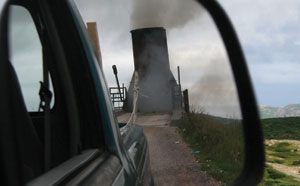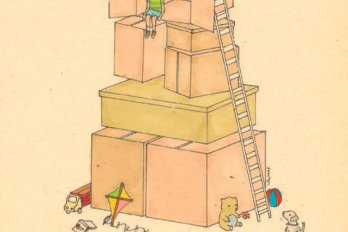cat ba island—It’s 4 p.m. on Cat Ba Island, off the coast of Vietnam in the South China Sea. A boozy lunch has asserted its will on the afternoon, and Rosi Stenke is struggling to stay sober. She’s due in Cat Ba Town in three hours for a meeting with an important man, the vice-chairman of the People’s Committee of nearby Haiphong. But the men here with us, three local shrimp farmers, are important, too. We’ve been sipping on rice brandy spiked with animal parts since 1 p.m., and they want to keep going. After the first toast, Stenke, a fifty-year-old behavioural scientist from a town near Munich, tells me not to raise my glass higher than that of the eldest among us, in this case the fifty-four-year-old Mr. Thanh.
“It’s like a gold rush here,” Stenke had told me beforehand. “People want to get as much out of the land as possible.” She has lived on this tiny island for eight years, and is the chief protector of one of the world’s rarest monkey species, the Cat Ba langur. The Vietnamese look to the forest for sustenance, medicine, even home decorations, and as a result the langur population here has dwindled to as low as fifty-three. (Thanks in part to Stenke’s work, that number has risen to sixty-eight.) The primates aren’t eaten, but their bones are boiled into a gluey, collagen-rich balm. And since traditional remedies hold more sway here than modern medicine does, the Cat Ba langur is just one of many species whose future is in jeopardy. Stenke warned me that I wasn’t likely to see a live langur if I visited. We’d spent the morning training our binoculars at cliffs to no avail before accepting an invitation for lunch at the waterside fish camp of Mr. Thanh.
The camp looks more like a petting zoo: turkeys and chickens scamper and cluck, a dog pants, and four songbirds chirp in cages. The yolk yellow eyes of two tawny fish owls seem capable of piercing the bars of their cage. The birds are also endangered, but not at the critical level of the langurs. Stenke says nothing about their captivity, and cringes when I ask. “In this job, I have to make a lot of compromises,” she says. “I feel like a bit of a prostitute.”
We sit cross-legged for lunch, around a large pot of fish stew set on a white-tiled terrace. Mr. Thanh, barrel chested and tanned to a rusty red, uncaps a big plastic detergent bottle full of rice brandy. He says the little flakes floating in the bottom are cobra bits. “There’s a belief here that anything from the forest gives you strength,” Stenke had warned me. “If you have a health problem, you look to the forest for the answer.” After a few rounds of snake brandy, we switch to a honeycomb-infused version.
Mr. Thanh — Stenke still calls him that — was once considered the best hunter here, even after he lost his right wrist and hand. Over the course of a courtship that lasted more than a year, she convinced him to switch from shooting at langurs to protecting them. That was six years ago, but she still feels as if this is a relationship she can’t take for granted. She overlooks things like the captive owls, visits often for lunch, and has never asked how Mr. Thanh’s wrist became a stump. (She learned elsewhere about his accident with dynamite while he was dredging for his shrimp farm.) Mr. Thanh has also recruited others to help, including his brother, the gaunt Mr. Canh, and his friend Mr. Chau, compact, weathered, and boyish.
As Mr. Canh mashes a fish gallbladder into bits for submersion in yet another jug of the local spirit, Mr. Thanh explains that the organ is good for stiff joints. “We’re not allowed to use the Cat Ba langur because of Rosi,” he says, earning drunken guffaws from the men and a nervous ha-ha from Stenke.
Talk has given way to giggling by now, and the sun is dropping behind the cliffs. Mr. Chau pushes his hair up into a mohawk, imitating the langur’s fluffy head. Stenke uses the moment of levity to break up the party; she has two hours to get back to her living quarters at Cat Ba National Park and clean up before trying to impress the vice-chairman of the People’s Committee of Haiphong on behalf of the langurs over dinner. She made it on time, a great relief. Etiquette is essential when a species hangs in the balance.




